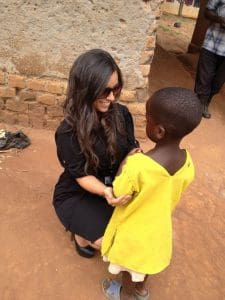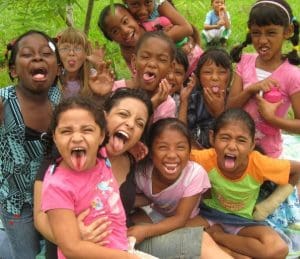Changemakers, Risktakers, Trailblazers & Peacebuilders. Member Spotlight: Veronica Jacob
Veronica Jacob is the founder of Uncommonly Positive, a for-profit, for-purpose social impact enterprise that inspires, educates, and spotlights creative people and change-makers dedicated to making a positive difference in the world through their life and their work. In addition to spearheading the planning for MBBI’s 2019 Peace Congress in Bali — in collaboration with her co-chair Dennis Phua— Veronica has recently joined the organization’s staff as the Director of Innovation and Impact Investment.
Playful, Personal, and Purposeful
 Veronica self-describes her style of mediation as the three Ps: Playful, Personal, and Purposeful. Her unique background as a Coptic Egyptian makes her acutely aware of religious, ethnic, and gender disparities. This identity has shaped her understanding of cultural diplomacy, mediation, and community cohesion. From Belize to South Africa, from Oklahoma to Uganda, Veronica has been able to make interpersonal and genuine connections with cultures globally.
Veronica self-describes her style of mediation as the three Ps: Playful, Personal, and Purposeful. Her unique background as a Coptic Egyptian makes her acutely aware of religious, ethnic, and gender disparities. This identity has shaped her understanding of cultural diplomacy, mediation, and community cohesion. From Belize to South Africa, from Oklahoma to Uganda, Veronica has been able to make interpersonal and genuine connections with cultures globally.
She obtained her bachelors from Duke in Public Policy, a multidisciplinary field committed to exploring complex social, economic, and political issues. But she sought out multiple opportunities to put theory into practice. Her first foray into social impact work was in Zambia, where she joined a group of young professionals to develop a community outreach initiative to establish a local hospital, HIV clinic, and citizen training program still in effect to date. Her social impact work continued in Belize. As a grant recipient from the Bill and Melinda Gates Foundation, working in partnership with Peacework, she helped develop life-skills curriculum for at-risk youth. Bringing together grassroots organizations and government ministries, they developed sustainable models for positive social change, reaching over 400 children across three cities. And in Australia, she conducted anthropological research, examining the unique dynamic between Aborigines and their European counterparts, which advanced cultural exchange as a mechanism for mutual understanding and cultural preservation.
After graduation, she traveled to Cape Town, South Africa for a professional development program where she could focus on the intersection between broadcast media and sustainable social change. She split her time working as a producer and presenter for Cape Town Television, a platform committed being “a voice for the people, by the people,” and as a research analyst for the Southern African Media and Gender Institute, exploring the lingering effects of social and economic disparities in the region. Veronica was asked to present an oral argument before the South African Parliament, advocating an amendment to a bill on xenophobia, which still included language that would condone practices of racial profiling. Consequently, the amendment to the bill was included, and the bill passed without the language condoning racial profiling.
More formative in her career, however, was when by happenstance, Veronica wandered into the Nelson Mandela Center for Conflict Resolution in Cape Town, which had an emphasis on facilitating community dialogues in post-apartheid South Africa. She became quickly engulfed in the world of peacebuilding, reconciliation, and conflict transformation.
Throughout her career, Veronica has based her mediation and social impact work on this modified quote from Mahatma Gandhi “Create the change you want to see in the world.” Because creativity is the root of change, and change is a creative process.
Finding Purpose in the Slums
 While U.S. Embassy Kampala played an integral role in her personal and professional development, Veronica’s most fulfilling moment took place in the most unlikely place. Bwaise is a sprawling slum in Kampala, Uganda, boasting only of its unrivaled crime rates, human trafficking, and unsanitary conditions. If a spotlight was ever brought to this forgotten place, it was never to shed a positive light. However, history tells countless stories that tribulation, when properly harnessed, can shape the most remarkable people. That was the inception of the Bwaise Red Carpet Event, an idea Veronica developed as a fellow in the U.S. Embassy’s Public Diplomacy & Cultural Affairs Office. The vision was to reshape the narrative of desperate people and to tell them, through stories like their own, that it was precisely these formidable conditions that could be their source of strength.
While U.S. Embassy Kampala played an integral role in her personal and professional development, Veronica’s most fulfilling moment took place in the most unlikely place. Bwaise is a sprawling slum in Kampala, Uganda, boasting only of its unrivaled crime rates, human trafficking, and unsanitary conditions. If a spotlight was ever brought to this forgotten place, it was never to shed a positive light. However, history tells countless stories that tribulation, when properly harnessed, can shape the most remarkable people. That was the inception of the Bwaise Red Carpet Event, an idea Veronica developed as a fellow in the U.S. Embassy’s Public Diplomacy & Cultural Affairs Office. The vision was to reshape the narrative of desperate people and to tell them, through stories like their own, that it was precisely these formidable conditions that could be their source of strength.
They would hold the event in the concrete and corrugated tin “cinema house,” where the youth and unemployed would traditionally go and pay five shillings to spend their day watching trashy American films. We wanted to transform this dark and uninspiring place into a space of empowerment and inspiration, using real stories of those who had overcome their same obstacles to achieve remarkable success.
“Bwaise Red Carpet Event” was an oxymoron at best. And while the concept was applauded in theory, no one wanted to take the “risks” associated with its execution. It was uncomfortable; it was time-consuming; it was dangerous; it was far; it was inconvenient; it didn’t have financial support; it wasn’t guaranteed to succeed. So in short, Veronica had the Embassy’s blessing but faced the project alone.
Over 500 attendees packed into the makeshift cinema hall. They heard from accomplished leaders — athletes to academics; statisticians to politicians — whose own stories reflected the struggles of Bwaise. Their partnership and presence represented solidarity the community had never seen. Bwaise was an outcast, but at that moment it was a star. The event was covered across major media outlets and was met with a standing ovation from the crowd. It was the first time, for many, that they saw a possibility beyond their current reality. And the moment she saw all the pieces come together, and the audience’s overwhelming response, she was overcome by the indescribable feeling of losing herself in the service of others.
After her graduation, she would go on to work with the Oklahoma Supreme Court to do ADR mediation throughout the states’ civil and family courts. She continues to practice conflict transformation, cultural diplomacy, and creative collaboration in all elements of her social impact work to date.
The Thrill of Consensus: Disruptors as Peacebuilders
Following her career after law school, one constant has emerged in Veronica’s life: the adrenaline of solving complex problems, the thrill of creativity in consensus-building, and the euphoria of transforming conflict and cultivating collaboration. Her mantra is the “build rapport with those you may not agree with.” And she accomplishes this goal as a mediator by breaking down barriers as creatively as possible.
 To encapsulate this thrill on an international level, Veronica has agreed to be one of the two co-organizers, alongside Dennis Phua from Singapore, for the 9th Biennial MBBI Congress. It will take place on November 6-8, 2019, at the Bali Intercontinental Hotel. Bali, Indonesia, was chosen as the hosting city for its accessibility to a global audience. The Congress’ theme is: DISRUPTORS: Being Peacebuilders in a World of Conflict with the purpose of spotlighting change-makers, and risk-takers, and trailblazers in the peacebuilding space. Veronica believes that “creativity comes from the conflict of ideas,” and peacebuilding is an innovative process. Click here for more details and to register for MBBI’s 2019 Congress in Bali.
To encapsulate this thrill on an international level, Veronica has agreed to be one of the two co-organizers, alongside Dennis Phua from Singapore, for the 9th Biennial MBBI Congress. It will take place on November 6-8, 2019, at the Bali Intercontinental Hotel. Bali, Indonesia, was chosen as the hosting city for its accessibility to a global audience. The Congress’ theme is: DISRUPTORS: Being Peacebuilders in a World of Conflict with the purpose of spotlighting change-makers, and risk-takers, and trailblazers in the peacebuilding space. Veronica believes that “creativity comes from the conflict of ideas,” and peacebuilding is an innovative process. Click here for more details and to register for MBBI’s 2019 Congress in Bali.
Article by Ben Lutz, MBBI Writer
